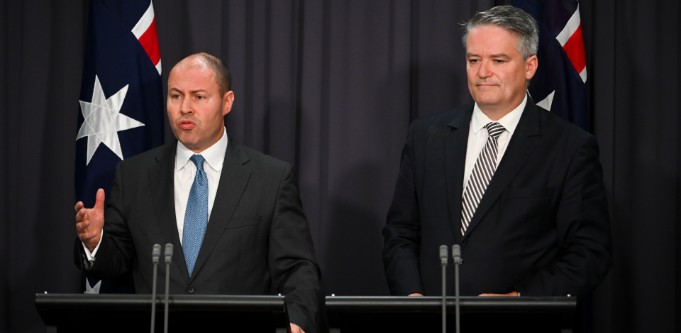
Treasurer Josh Frydenberg and Finance Minister Mathias Cormann. Source: AAP Image/Lukas Coch.
There are now fewer than 100 days until the Morrison government’s historic $70 billion JobKeeper wage subsidy program officially expires.
On September 27, almost one million employers are expected to be booted off the payments, which deliver $1,500 a fortnight for each eligible worker on the payroll.
And while many sectors have begun recovering from the COVID-19 pandemic, with restrictions easing across the country over the past month, there are growing concerns that the end of JobKeeper will cause a wave of insolvencies in the small business sector.
But there’s still plenty of time for Treasurer Josh Frydenberg to use his broad authority over the program to make big changes to who is eligible and, crucially, how much each worker receives each fortnight.
Here’s what we know so far about how JobKeeper is going to evolve over the next three months.
The July review
Treasury has been undertaking a wide-ranging review of the JobKeeper program for more than a month now, examining everything from what type of workers are receiving the payments, to the quantum of the subsidies.
There has been speculation that government is keen to scale back the cost of the program, particularly because the economic impact of the coronavirus was not as severe as was estimated when the program was announced in late March.
About 120,000 childcare workers are set to be booted off JobKeeper in July, under a plan that will see the subsidies replaced by sector-specific support measures, and Prime Minister Scott Morrison has said the federal government will not hesitate to do the same with other industries where a case can be made.
The tourism sector, for example, is lobbying hard for an extension of the program for their industry, arguing travel bans are still limiting businesses’ ability to trade. This idea has the support of federal parliamentarian Warren Entsch, who last week claimed to have Morrison’s ear on the issue.
The quantum of the subsidy itself is also possibly on the chopping block, particularly for those workers who have experienced a pay bump as a result of the $1,5000 minimum pay guarantee attached to the program.
Reports surfaced on Friday that Morrison is considering varying the program to ensure businesses still struggling in the wake of the pandemic aren’t adversely affected by the September deadline.
Employers will know more on July 23, when Frydenberg and Finance Minister Mathias Cormann are due to hand down a mini-budget of sorts, including the results of the JobKeeper review.
The September cliff
With JobKeeper to expire at the end of September alongside several other government support measures, including rent deferrals, there is wide-ranging concern about what will happen to the businesses that are currently being supported by these programs.
Accounting groups, including CPA Australia, have called on the government to taper off the program, in a bid to ensure support does not all end at once across the economy, but so far the federal government hasn’t budged.
Adding to the complexity of the situation are insolvency practices, which were essentially paused by the Morrison government in March. This stay on execution will expire in September though, meaning many businesses will be forced to answer when creditors come calling much faster than they have been.
That’s good news for subcontractors and other businesses struggling to get invoices paid amid the pandemic, but bad news for anyone who may have been trading while insolvent in recent months under a pile of coronavirus-induced debt.
Tax time to boot
In a twist of fate, the JobKeeper program is also running through the busy end of financial year period, which means some added administration. But spare a thought for your accountant or bookkeeper, who on top of getting your business into JobKeeper, is now having to deal with making sure your assessable income is in tip-top shape.
Sole traders receiving JobKeeper subsidies need to remember that JobKeeper payments must be declared as assessable income on tax returns. This is an important step, because as we’ve reported, you might get billed if you neglect to let the ATO know.


COMMENTS
SmartCompany is committed to hosting lively discussions. Help us keep the conversation useful, interesting and welcoming. We aim to publish comments quickly in the interest of promoting robust conversation, but we’re a small team and we deploy filters to protect against legal risk. Occasionally your comment may be held up while it is being reviewed, but we’re working as fast as we can to keep the conversation rolling.
The SmartCompany comment section is members-only content. Please subscribe to leave a comment.
The SmartCompany comment section is members-only content. Please login to leave a comment.